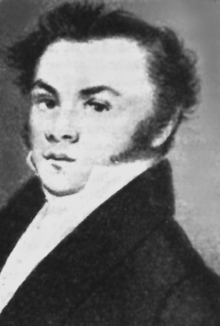|
Karl Eichwald
Karl Eduard von Eichwald known as Karl Eichwald (Russian: Эдуард Иванович Эйхвальд, Eduard Ivanovich Eykhvald; 4 July 1795, in Mitau, Courland Governorate – 10 November 1876, in Saint Petersburg) was a Baltic German geologist, physician, and naturalist, who lived his whole life in the Russian Empire. CareerEichwald was a Baltic German born at Mitau in Courland Governorate. He became a doctor of medicine and professor of zoology in Kazan in 1823; four years later professor of zoology and comparative anatomy at Vilnius; in 1838 professor of zoology, mineralogy and medicine at St. Petersburg; and finally, professor of palaeontology in the institute of mines in that city.[1] He travelled much in the Russian Empire, and was a keen observer of its natural history and geology. He died at St. Petersburg.[1] Eichwald was a supporter of Darwinism.[2] WorksHis published works include Reise auf dem Caspischen Meere und in den Caucasus, 2 volumes (Stuttgart and Tübingen, 1834-1838); Die Urwelt Russlands (St Petersburg, 1840-1845); Le Lethaea Rossica, ou Paléontologie de la Russie, 3 volumes (Stuttgart, 1852-1868), with Atlases.[1] In the scientific field of herpetology he described several new species of reptiles.[3] See alsoNotes
References
External links
|
||||||||||||||||||||||
Portal di Ensiklopedia Dunia
